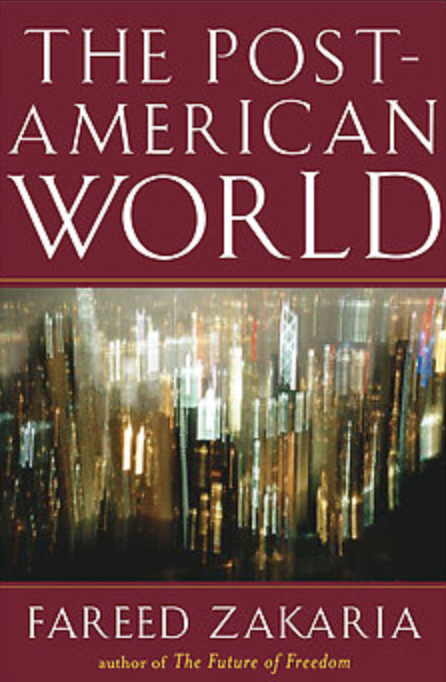The Rise of Non-Americanism
Washington Post |

After the Iraq war, Fareed Zakaria argued in his Newsweek column that the world's new organizing principle was pro- or anti-Americanism. But as the Iraq muddle drags on and China rises, the larger story of the post-Cold War era has come into sharp relief: We are not the center of the universe. It matters less that particular countries are pro- or anti-American than that the world is increasingly non-American. We need to get over ourselves.
Zakaria's The Post-American World is about the "rise of the rest," a catchy phrase from one of the most widely cited writers on foreign affairs. His prism is correct: We should focus more on the "rest," even if America is still the premier superpower. But within this broad approach, Zakaria leaves policy-makers to figure out how to rank challenges and restore U.S. legitimacy.
Zakaria zooms in on Asia, especially India and China, which he uses as proxies for "the rest." The first third of the book sets out his thesis -- "For the first time ever, we are witnessing genuinely global growth" -- and the next third describes how China's economy has doubled every eight years and how India may have the world's third largest economy by 2040.
This year has brought a flood of books on Asia's rise, including Bill Emmott's Rivals and Kishore Mahbubani's The New Asian Hemisphere. For the most part, they embody the "world is flat" thesis -- lots of economic statistics, little geography. But geopolitics is about more than growth rates. It matters that China borders a dozen more countries than India does, isn't hemmed in by a vast ocean and the world's tallest mountains, has a loyal diaspora twice the size of India's and enjoys a head start in Asian and African marketplaces. Zakaria's chapters on China and India, though of equal length, should not connote equivalency, and all "the rest" cannot be happily lumped together. Does China's example tell us what has gone wrong in Venezuela and Pakistan, and could go wrong in Egypt and Indonesia?
Ironically, the final third of The Post-American World, which focuses on us rather than on "the rest," is the strongest. Zakaria argues that America's world-beating economic vibrancy co-exists with a dysfunctional political system. "A 'can-do' country is now saddled with a 'do-nothing' political process, designed for partisan battle rather than problem solving," he writes. That makes it hard to devise a grand strategy, and Zakaria offers just a few "simple guidelines" on the need to set priorities, build global rules and be flexible. But in this non-American world, it may be too late to restore U.S. leadership. "The rest" is moving on.